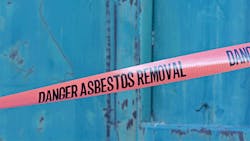AIHA Forecasts Mold, Title Licensing, Hazardous Chemicals and Patient Handling as Top State Legislative Issues
In 2013, the American Industrial Hygiene Association (AIHA) government affairs department devoted 30 percent of its time to state government relations, monitoring legislation and taking action on bills of interest to occupational and environmental health and safety professionals. According to the association, mold abatement and safe patient handling top the list of regulatory priorities at the state level.
“With the federal government tied up in other matters – the budget and debt ceiling, for example – and a broken rulemaking process, it takes months, if not years, for legislation and regulations to be enacted at the federal level,” said Aaron K. Trippler, AIHA’s chief liaison with Congress and federal agencies. “That’s why it’s important to devote resources to monitor state legislation and engage in rulemaking efforts of interest to the OEHS profession at the state level. And nowadays, it appears that legislation passed at the state level eventually comes up at the federal level.”
The most notable issues likely to be found on states’ legislative and regulatory agendas in the coming months include:
Safe patient handling: Currently, approximately 12 states have enacted some form of legislation or regulation addressing safe patient handling. The issue also has seen movement on the federal level with OSHA recent launch of new educational web resources to help hospitals prevent worker injuries, enhance safe patient handling programs and implement health and safety management systems.
Mold abatement and licensing: The states have continued to examine the issue of mold abatement to determine whether it should be regulated and whether those involved in this work should be licensed. However, as some states are attempting to set exposure limits, others are trying to set standards or legislation to abate and remediate. One of the major problems in enacting this type of legislation is deciding who is qualified for licensing and who is not.
Hazardous substances: More states have begun discussing how to deal with hazardous materials – addressing everything from asbestos to all kinds of chemicals. This may be due in part to the fact that the federal government continues to face the consequences of chemical hazards, such as those that caused the devastating fertilizer plant explosion in West, Texas, in 2013.
Title protection and legal recognition of the profession: AIHA has been successful in enacting this title protection legislation in more than 20 states. To date, there are more than 350 titles in occupational safety and health, yet fewer than 30 or so are granted by accredited bodies such as the American Board of Industrial Hygiene (ABIH). Policymakers are at a loss as to which professionals to recognize and how to determine their qualifications.
About the Author

Sandy Smith
Sandy Smith is the former content director of EHS Today, and is currently the EHSQ content & community lead at Intelex Technologies Inc. She has written about occupational safety and health and environmental issues since 1990.
